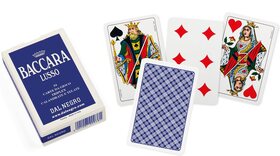The Rules of Blackjack
Blackjack was introduced into the casino in the twentieth century and has become one of the most popular casino games. The rules of Blackjack can vary from casino to casino - if in doubt, use the casino's house rules.
See also: Casino Games.
Aim
The aim of blackjack is to finish the game with a higher total than that of the dealer, without exceeding 21. Going over 21 is commonly known as ‘busting’ and means an automatic loss.
The Play - Basic Rules
Blackjack is usually played at a table of 2-7 players and uses one to eight 52-card decks. All number cards (2-10) score the value indicated on them. The face cards (Jack, Queen, King) score 10 points and Ace can either be treated as 1 or 11. At the beginning of each round, all players place their bets in their betting positions - also known as ‘boxes’. After the bets have been placed, all players are dealt two cards face-up in front of their respective betting positions. The dealer receives two cards, one face-up and another face-down. Starting to the left of the dealer, each player is given a chance to draw more cards. The players can either ‘hit’ or ‘stand’. If the player calls out ‘HIT’, they are given an extra card. They can then either call out ‘HIT’ again, or ‘STAND’ if they do not wish to draw any more cards. The player can ‘HIT’ as many times as they wish, but have to aim not to ‘bust’ (exceed a total of 21). If the player busts, they immediately lose their bet. After each player has played and either stood or busted, the dealer takes their turn. They can, again, either ‘HIT’ or ‘STAND’. If the dealer’s hand exceeds 21, all players who didn't bust win immediately - their bet is returned along with a matching amount from the dealer's bank. If the dealer reaches a valid hand, the cards are totalled and each player’s hand is compared to the dealer’s. If the player scored higher than the dealer, they win. If the player ties with the dealer, the original bet is returned to the player. Otherwise, the player loses their bet. A perfect hand combines an ace with a 10, Jack, Queen or King and is known as a ‘Blackjack’.
Other Options that may be available during the hand
In addition to the basic rules, most casinos offer a few other options which are available to players in certain situations. It is always wise to consult the house rules to see the details of any allowed options.
Split
If the first two cards are a pair, the players are allowed to split those, thus creating two hands rather than the normal one per seat. To fund the split, the player has to place a second bet, of equal value to the first.
Double Down
After receiving the first two cards, players can double their bet while hitting. When doubling down, player receives one extra card only and cannot hit again. Most casinos allow cards to be split again if the second card makes another pair - but some have limits on the number of times a player can split.
Insurance
Insurance is a side bet, which is offered to the players when the dealer’s up card is an ace. It insures the player against the dealer having a ‘blackjack’ and gives them a chance to break even on the hand, if the dealer’s cards total 21.
Insurance is offered before the dealer checks their face-down card.
Surrender
If a player believes they will be unable to beat dealer’s hand, they can choose to ‘surrender’. In this strategy, players fold the hand, and risk loosing only half of the bet, rather than the whole amount.
A player can only forfeit their hand before receiving extra cards.
Bet Behind
Busy, live casinos sometimes offer an option to take side bets, otherwise known as ‘bet behind’. This is where a limitless number of people take a bet behind the main seven seated players, wagering that they will win the hand.
These rules are provided by Masters Traditional Games, an Internet shop selling quality traditional games, pub games and unusual games. For general information or for copying and copyright, see our Rules Information page.
Our rules are comprehensive instructions for friendly play. If in doubt, always abide by locally-played or house rules.
Copyright James Masters, 2025. All rights reserved.
GTA 5 modded accounts have become increasingly popular, offering players an enhanced and customized gaming experience through unique features and upgrades.

























